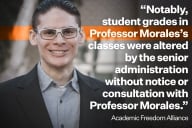You have /5 articles left.
Sign up for a free account or log in.
Signs of the economic downturn are evident many places you turn in higher education these days: in the exploding demand for student financial aid, the imposition of faculty and staff furloughs, and an upturn in the number of nonprofit colleges being transformed into for-profit institutions.
It remains unclear, though, just how much impact the financial crisis is having on colleges' ability to satisfy the expectations of accrediting agencies, at least to judge by the latest round of decisions made last week by the Commission on Colleges of the Southern Association of Colleges and Schools, the second-largest of the nation's regional accrediting agencies.
The commission placed two colleges on probation and seven institutions on warning, many either for direct financial reasons (running afoul of the agency's standards on financial stability or inadequate resources) or for reasons that might reflect underlying economic woes (such as questions about the mix of part-time vs. full-time faculty).
But numerous colleges also came off the agency's lists of sanctioned institutions, leaving the accreditor's president, Belle S. Wheelan, ambivalent about just how much impact the economy is having on her member institutions -- at least so far. "It's obvious that the economy has impacted these folks to some extent," she said. "But we're still seeing a lot more positive than negative actions," so it would be wrong -- or at least premature -- to conclude, from the accreditor's point of view, that the downturn has higher education in a freefall, Wheelan said.
Financial difficulties contributed heavily to the problems at the two institutions on which the Southern Association imposed its most serious sanction (short of denial of accreditation): probation. Concordia College, in Selma, Ala., ran afoul of several of the accreditor's standards related to financial stability and resources, Wheelan said, while Saint Paul's College, in Virginia, has had a series of economic woes, too. Both institutions are small, independent historically black colleges, which, like many small, enrollment-driven private institutions, have faced significant stress in the last several years.
Southern's college commission placed seven institutions on the less-serious "warning" status: Augusta Technical College, in Georgia; Bauder College, a for-profit institution in Georgia; Erskine College, in South Carolina; Florida Christian College; Pamlico and Randolph Community Colleges, both in North Carolina; and Stillman College, a historically black institution in Alabama. In several of those cases, the accrediting agency was concerned about the adequacy of the colleges' faculty resources, with "more dependence on adjuncts than is probably appropriate for quality," Wheelan said.
Erskine College has been deeply embroiled in turmoil over its governance, with faculty members and others expressing fears about efforts by the Associate Reformed Presbyterian Church to exert significantly more control over the direction of the affiliated college. Wheelan said that the accreditor's college commission was concerned enough about governance of the college to place Erskine on warning, but that Southern, citing the hiring of a new president and a continuing legal fight over the institution's direction, wanted to give the college's leaders more time to work through the problems. (Reports over the weekend suggest a compromise is in the works.)
Positive Actions
Several institutions that had been on Southern's lists of troubled institutions came back into the accreditor's good graces.
Texas Southern University, which was placed on probation in 2007 for a broad array of shortcomings in the wake of a financial misconduct scandal involving the institution's former president, Priscilla Slade, was restored to fully accredited status by the college commission. The commission also reinstated four institutions -- ECPI College of Technology and Eastern Shore Community College, both in Virginia; Lamar University, in Texas; and Tougaloo College, in Mississippi -- that had been on warning status. Texas Southern and Tougaloo are both historically black institutions.








